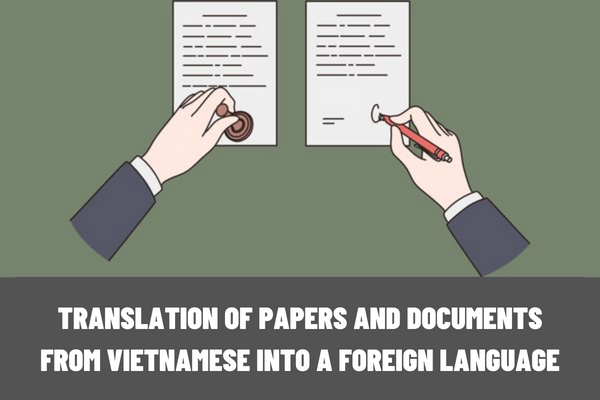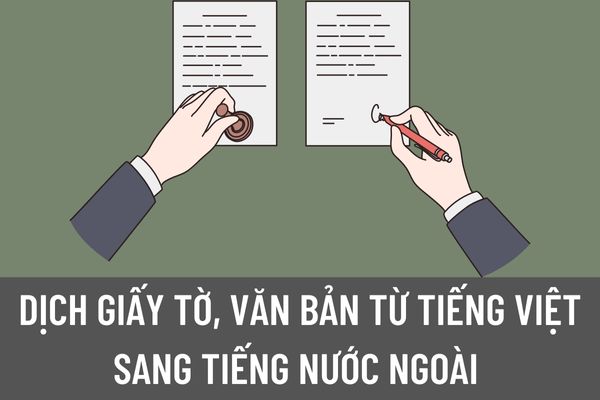Who has the right to translate papers and documents from Vietnamese into a foreign language to notarize the translation?
- Who has the right to translate papers and documents from Vietnamese into a foreign language to notarize the translation?
- What are the rights and obligations of interpreter collaborators of notarial practice organizations in Vietnam?
- What are the cases where the notary is not allowed to notarize translations?
- What are the conditions for a notarized translation?
Who has the right to translate papers and documents from Vietnamese into a foreign language to notarize the translation?
Regarding the translation of documents, according to Clause 1, Article 61 of the 2014 Law on Notarization in Vietnam stipulating as follows:
Notarization of translations in Vietnam
1. The translation of papers and documents from Vietnamese into a foreign language or vice versa for notarization shall be done by interpreters being collaborators of notarial practice organizations. These collaborators must be graduates of foreign language universities or other universities who are fluent in the foreign language used. These collaborators shall take responsibility before notarial practice organizations for the accuracy and consistency of their translations.
Thus, the translation of papers and documents from Vietnamese into a foreign language or vice versa for notarization shall be done by interpreters being collaborators of notarial practice organizations.
At the same time, collaborators shall take responsibility before notarial practice organizations for the accuracy and consistency of their translations.
Who has the right to translate papers and documents from Vietnamese into a foreign language to notarize the translation?
What are the rights and obligations of interpreter collaborators of notarial practice organizations in Vietnam?
Pursuant to Clause 3, Article 22 of Circular No. 01/2021/TT-BTP stipulating as follows:
Interpreter collaborators of notarial practice organizations in Vietnam
....
3. Rights and obligations of interpreter collaborators:
a) Receive interpreter remuneration as agreed with the notarial practice organization;
b) Take responsibility for the accuracy and properness of the content of the translation made by them;
c) Refund the restitution that the notarial practice organization has made for damage caused by the interpreter collaborator’s fault according to Article 38 of the Notarization Law;
d) Comply with the provisions of the law on translation and the working rules of the notarial practice organization;
dd) Other rights and obligations as agreed with the notarial practice organization or as prescribed by law.
Thus, the rights and obligations of interpreter collaborators:
- Receive interpreter remuneration as agreed with the notarial practice organization;
- Take responsibility for the accuracy and properness of the content of the translation made by them;
- Refund the restitution that the notarial practice organization has made for damage caused by the interpreter collaborator’s fault according to Article 38 of the Notarization Law;
- Comply with the provisions of the law on translation and the working rules of the notarial practice organization;
- Other rights and obligations as agreed with the notarial practice organization or as prescribed by law.
What are the cases where the notary is not allowed to notarize translations?
Pursuant to the provisions of Clause 4, Article 61 of the 2014 Law on Notarization in Vietnam, cases where the notary is not allowed to receive and notarize translations, including:
Notarization of translations in Vietnam
...
4. A notary may not receive and notarize translations in the following cases:
a/ He/she knows or must know that the originals are granted ultra vires or are invalid or counterfeit;
b/ Papers or documents requested for translation have been erased or modified, have additions or omissions, or are damaged or rumpled, making their contents unreadable;
c/ Papers or documents requested for translation are classified as state secrets; papers or documents are banned from dissemination under law.
Thus, your company's English contract must be translated by a collaborator of the notary office/ notary bureaus, when your company translates it yourself, the notary office/ notary bureaus may not accept it.
What are the conditions for a notarized translation?
Pursuant to Article 61 of the 2014 Law on Notarization in Vietnam on notarization of translations as follows:
Notarization of translations in Vietnam
1. The translation of papers and documents from Vietnamese into a foreign language or vice versa for notarization shall be done by interpreters being collaborators of notarial practice organizations. These collaborators must be graduates of foreign language universities or other universities who are fluent in the foreign language used. These collaborators shall take responsibility before notarial practice organizations for the accuracy and consistency of their translations.
2. A notary shall receive originals of papers and documents to be translated, check them before handing to an interpreter being a collaborator of the notarial practice organization for translation. The interpreter shall sign every page of his/her translations before the notary writes the testimonies and signs every page of such translations.
Every page of translations shall be appended with the “Translation” mark in the right top blank space; translations shall be attached with copies of originals and have every two adjoining sheets appended with an overlapping seal on their inner edges.
3. Testimonies of a notary on translations must clearly state the time and place of notarization, full name of the notary and name of the notarial practice organization; full name of the interpreter; certify that the signature in the translations is truly that of the interpreter; and certify that the translations are accurate and consistent with law and social ethics; such testimonies must bear the signature of the notary and seal of the notarial practice organization.
Thus, the first condition for a translation to be notarized is that the translation must be performed by interpreters being collaborators of notarial practice organizations.
LawNet
